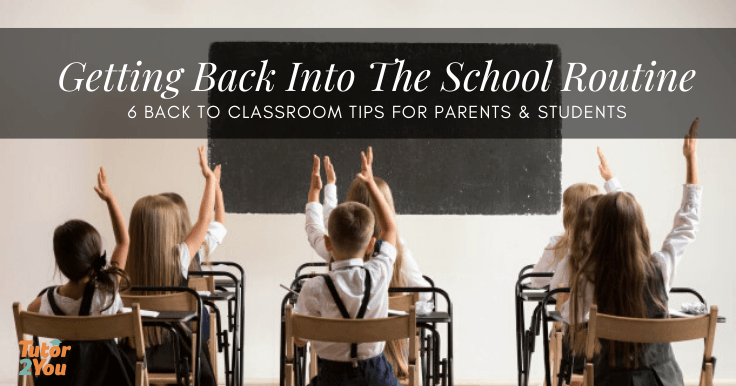
Getting Back Into The School Routine
Since the beginning of Term 2, students have been learning from home with their parents but now, it is almost over. All students will return to school before the end of May in Queensland & 2nd week of June in Victoria.
While the transition of remote learning to back to school can be a little stressful, there are ways to help reduce the ‘back to school stress’ for both parents and their kids.
Many parents find it hard to keep their child focused and motivated throughout the whole school term but this can change. The first couple of weeks are actually the best times to set up your goals and routines, reduce distractions, and improve on things that matter most. These tips will help you approach your child’s school term with a positive, more productive end in sight.
1. Make it a Family Affair
Getting ready to go back into the classroom set up can be an exciting as well as emotional time for the kids. Putting a positive spin on the upcoming experience can help the child feel excited about finally going back to school.
Get involved by discussing fun things to look forward to in school, seeing old friends again or making new ones.
2. Avoid morning meltdowns
Morning routines can make or break your child’s school day. Preparations the night before (clothes, bags, breakfast, lunch prep) can reduce morning stress for you and your child.
Checklists for morning routines are great for older children. This will give them a sense of responsibility as they do their part for smooth-running mornings. Use pictures instead of written instructions for younger kids.
3. Talk about goals
Goal-setting for an academic and overall improvement of your child should be done even before the school term starts. For sure, you've already laid some during the remote learning but if you haven’t, start spending time with your child and writing down specific goals for the rest school term.
Encourage your child to list SMART or MTO goals. Here are some tips to get started setting goals.
4. Reduce distractions
While gadgets, including television and computers were the main tools for the remote learning, now that students are going back into the classroom these tools are now considered as distractions.
While these technologies may sometimes be needed for academic-related activities, limiting the time your child exposes themselves to these things will have greater dividends at the end, academically and holistically.
5. Maintain a good parent-child communication
Make sure you spend quality time with your kids while letting them share the good and not so good parts of their school days. Make weekends special and set family time after school.
6. Boost their confidence
Encouragement is what every student needs from their parents. From young students right through to teenagers, positive words can help relieve stress, overcome difficulties, provide a better understanding, and inspire success.
Parental encouragement is incomparable to other motivations students get from peers or even from teachers. How well do you encourage your child? Simple gestures (smile, nod, pat on the back), compliments, rewards and incentives, and even your mere presence will go a long way in establishing your child’s confidence and self-esteem.
These proactive approaches can help you and your child gets back into a positive back-to-school routine and a meaningful and successful school term.
In-home tutoring is a fantastic way to keep students, on track motivated and accountable. If you’re considering getting your child one-on-one support this term. Why not request your no-obligation in-home consultation and assessment, it’s absolutely free. Book online here or call 1300 4200 79.



